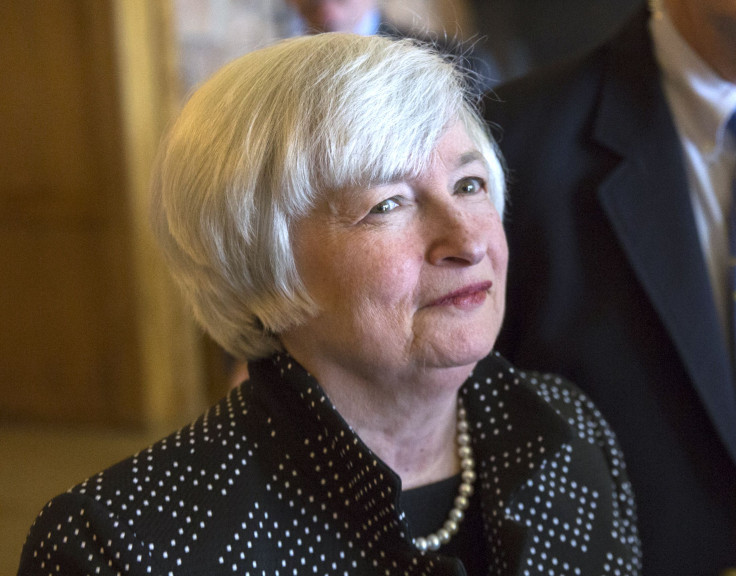Fed To Cut Bond Buying By $10B, Keep Interest Rates Near Zero For 'Considerable Time'

The Federal Reserve’s policymaking committee said Wednesday it will reduce its bond-buying program by $10 billion to $15 billion a month and may end the purchases in October if economic conditions allow, as expected. The latest monetary policy announcement indicates borrowing costs won't rise until next year at the earliest.
"If incoming information broadly supports the Committee's expectation of ongoing improvement in labor market conditions and inflation moving back toward its longer-run objective, the Committee will end its current program of asset purchases at its next meeting" in October, the Fed said in its official policy statement.
The comments come at the end of the Federal Open Market Committee’s September two-day meeting, one of eight meetings a year. Economists and market watchers had expected the Fed to scale back its bond buying and shift focus to the timing of an interest rate hike, which Fed officials are debating as they track economic indicators to gauge the economy’s health.
"In determining how long to maintain the current 0 to 0.25 percent target range for the federal funds rate, the Committee will assess progress--both realized and expected--toward its objectives of maximum employment and 2 percent inflation," the Fed said. "The Committee continues to anticipate, based on its assessment of these factors, that it likely will be appropriate to maintain the current target range for the federal funds rate for a considerable time after the asset purchase program ends."
Throughout the recovery from the 2008-2009 financial crisis, the Fed has used its asset-purchase program, also known as quantitative easing, to keep interest rates near zero, allowing businesses and consumers to borrow money cheaply and finance purchases like investments, homes and cars.
When the Fed believes the economy’s growth and hiring will continue picking up and inflation will remain consistent at 2 percent growth, it will likely raise the interest rate it authorizes banks to charge each other for lending. That would make taking out loans more expensive for businesses and consumers. If the Fed overestimates the economy’s strength and raises interest rates too soon, it would halt an already weak housing recovery and send unemployment skyrocketing. But doing nothing would erode the Fed's power to band-aid the economy with easy money in the economy's next recession.
Since March, the Fed has said an interest rate hike would take place a "considerable time" after its quantitative easing program ends. Yellen has said that the phrase meant six months, though in August she emphasized that “monetary policy is not on a preset path” and the Fed will be monitoring incoming data on inflation and the labor market to determine next steps.
"There is no fixed mechanical interpretation of what the term 'considerable time' means," Yellen said when a reporter asked about the term at the press conference Wednesday. The Fed's policy choices are "data dependent," she said.
The Fed is tracking more than a dozen indicators of the labor market.
"The labor market has yet to fully recover," Yellen said. "There are still too many people who want jobs who can’t find them, too many working part-time who want full-time work and too many not looking for a job who would be if the job market were stronger."
The August jobs report showed weaker-than-expected employment, but overall the labor market seems to be gradually improving this year, with the latest measure of unemployment at 6.1 percent. But many Americans have left the labor force so are not considered unemployed, and wage growth has remained slow, barely keeping pace with inflation at about 1.5 to 1.7 percent, just below the Fed’s 2 percent target.
On Wednesday, the Fed also released updated forecasts of U.S. economic performance, estimating growth of 2 to 2.2 percent this year, 2.6 to 3 percent in 2015, 2.6 to 2.9 percent in 2016 and 2.3 to 2.5 percent in 2017, all revised down from June forecasts.
© Copyright IBTimes 2024. All rights reserved.





















